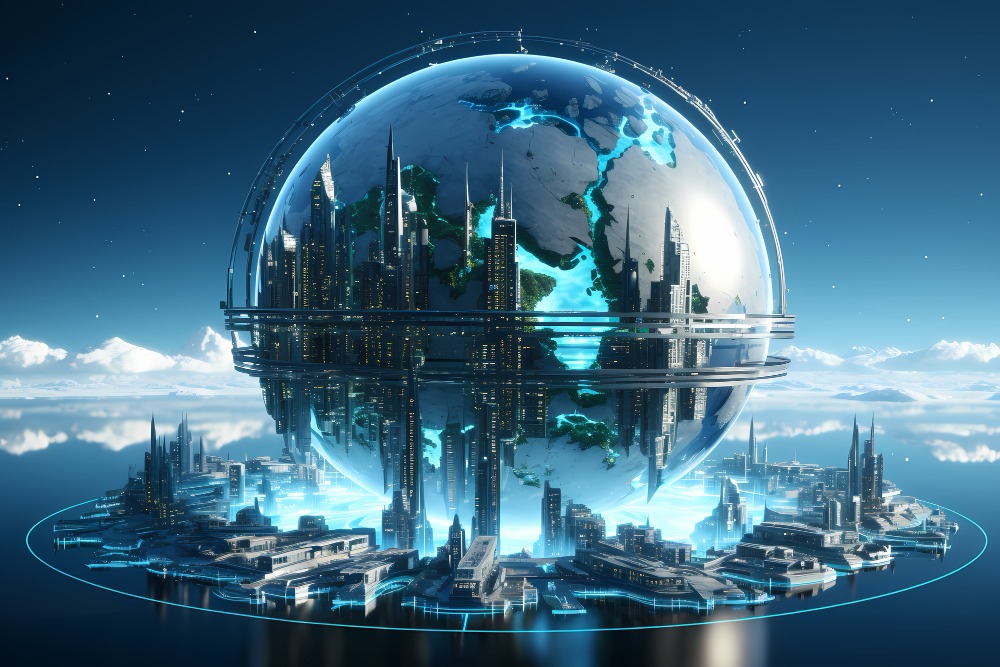
Beyond the Digital Divide: How AI is Reshaping the American Landscape
In the vast tapestry of American history, innovation has always been a defining thread. From the steam engine to the internet, each major technological leap has profoundly reshaped society, economy, and even governance. Today, we stand on the precipice of another, perhaps even more transformative, revolution: the era of Artificial Intelligence (AI). AI is not merely a new tool; it’s a paradigm shift, capable of redefining everything from how we work and learn to how we govern and interact.
The promise of AI is immense – unlocking new scientific breakthroughs, driving unprecedented economic growth, and solving complex societal challenges. Yet, its rapid ascent also brings a wave of apprehension: job displacement, ethical dilemmas, privacy concerns, and the specter of autonomous systems. As AI permeates every facet of life, America faces a critical challenge: how to harness its transformative power while mitigating its inherent risks. Understanding this technological tsunami requires looking back at how past disruptions have shaped the nation, and then peering forward into an increasingly AI-driven future.
Historical Echoes: Riding the Waves of Innovation
America’s journey through technological change offers critical insights into the current AI revolution:
- The Industrial Revolution (18th-19th Centuries): This era fundamentally transformed agricultural societies into industrial powerhouses. New machinery in textile mills and factories led to mass production, urbanization, and a dramatic shift in labor. While it created immense wealth, it also brought severe social dislocations: poor working conditions, child labor, and stark economic inequality. The debates over labor rights, safety regulations, and the balance between capital and labor in the face of automation echo in today’s discussions about AI’s impact on jobs.
- The Dot-com Bubble (Late 1990s): This period of explosive growth in internet-based companies, fueled by speculative investment, showcased the power of digital connectivity. While the bubble eventually burst, it laid the groundwork for the modern digital economy. It demonstrated how rapidly new technologies could create and destroy industries, and how quickly societal norms around information and communication could evolve. The wild optimism and subsequent reckoning offer lessons in managing technological exuberance.
- The Mobile Revolution & Social Media Boom (2000s-2010s): The widespread adoption of smartphones and the rise of social media platforms ushered in an era of hyper-connectivity. This transformed personal communication, media consumption, and political discourse. It also brought new challenges related to privacy, misinformation, mental health, and the unprecedented collection of personal data by tech giants. These issues, particularly concerning data privacy and the societal influence of powerful tech platforms, are now amplified by AI.
These historical precedents highlight a recurring pattern: technological progress is rarely linear or solely benevolent. It creates immense opportunities but also demands careful societal adaptation, ethical considerations, and robust governance frameworks.
Present Challenges: Navigating the AI Frontier
Today’s AI era brings a unique set of challenges that touch every aspect of American life:
- Effects on Labor & Employment: AI and automation are already reshaping the workforce. While some argue that AI will create new, higher-skilled jobs, others warn of widespread displacement, particularly in routine, knowledge-based, and even creative sectors. The concept of “reskilling” and “upskilling” the workforce is paramount, but the pace of change outstrips traditional educational models. This raises questions about economic security, the future of work, and the potential for increased economic inequality if the benefits of AI are not widely distributed.
- Privacy & Surveillance: AI systems thrive on data. The massive collection and analysis of personal data by governments and corporations raise profound privacy concerns. From facial recognition technology in public spaces to predictive policing and hyper-personalized advertising, AI enables unprecedented levels of surveillance. Debates about data ownership, consent, and the balance between security and civil liberties are intensifying, challenging existing legal frameworks.
- Governance & Regulation: Governments around the world, including the U.S., are scrambling to understand and regulate AI. The challenge is immense: how to foster innovation without stifling it, how to protect citizens without hindering progress, and how to define ethical guidelines for autonomous systems. Issues range from bias in algorithms (e.g., in hiring, lending, or criminal justice) to accountability for AI-driven decisions and the potential for AI in warfare. The current regulatory patchwork is insufficient for the speed and scale of AI’s development.
- Misinformation & Deepfakes: AI’s ability to generate realistic but fake content (deepfakes, AI-generated text, audio) poses a significant threat to information integrity and democratic processes. The ease with which persuasive but false narratives can be created and disseminated could further exacerbate political polarization and erode trust in legitimate sources of information.
Future Outlook: Tech Power Shifts and Regulatory Implications
The global race for AI dominance is already underway. Nations like China are heavily investing in AI research and deployment, aiming to surpass the U.S. in key technological capabilities. This competition is not just economic; it has profound geopolitical implications, determining future military advantages, economic leadership, and global influence.
Forecasting future tech power shifts: The U.S. currently holds a strong lead in AI research and development, fueled by its robust private sector, leading universities, and venture capital ecosystem. However, maintaining this lead requires sustained investment in R&D, a strong talent pipeline, and effective regulatory frameworks that balance innovation with responsible deployment. If other nations develop more permissive or strategic regulatory environments, they could potentially outpace the U.S.
Regulatory implications: The next few years will be critical in shaping AI regulation. We could see:
- Sector-specific regulations: Tailored rules for AI in healthcare, finance, or autonomous vehicles.
- Ethical AI frameworks: Guidelines and standards for fairness, transparency, and accountability in AI development and deployment.
- International cooperation: Efforts to establish global norms and standards for AI to prevent a “race to the bottom” on ethics and safety.
- National AI strategies: Coordinated government efforts to fund research, develop talent, and strategically deploy AI for national benefit.
Hot Take: Is AI Humanity’s Greatest Leap Forward, or Its Most Dangerous Experiment?
The debate rages: Is AI the key to unlocking unimaginable human potential, solving climate change, curing diseases, and ushering in an era of unprecedented prosperity? Or is it a Pandora’s Box, risking widespread job losses, erosion of privacy, autonomous warfare, and even existential threats to humanity? The truth likely lies somewhere in between, but the extremes of optimism and pessimism highlight the profound, unsettled questions facing society. The choices we make now regarding AI’s development and governance will determine whether it becomes a force for profound good or a catalyst for unforeseen crises.
Navigating the AI Era: A Generational Imperative
The AI revolution is not coming; it is here. Its impact on labor, privacy, governance, and even the geopolitical balance of power is already being felt. Like past technological disruptions, AI presents America with both extraordinary opportunities and daunting challenges. The nation’s ability to adapt, innovate responsibly, and establish clear ethical and regulatory guardrails will define its economic competitiveness, its social cohesion, and its global standing in the 21st century. The stakes are higher than ever, demanding a proactive, thoughtful, and inclusive approach to integrating AI into the fabric of American life.
Interactive Element:
Poll: “Are you more excited or concerned about the rise of AI?”
- More Excited: Seeing the potential for innovation and progress.
- More Concerned: Worried about job loss, privacy, and ethical dilemmas.
- A mix of both.
Guest Expert Quote:
“AI is fundamentally reshaping the relationship between humans and technology, and by extension, humans and each other. The critical challenge isn’t just building smarter machines, but building wiser societies that can wield this power responsibly, ensuring it serves humanity rather than superseding it.” – Dr. Fei-Fei Li, Professor of Computer Science at Stanford University and Co-Director of the Stanford Institute for Human-Centered AI.


